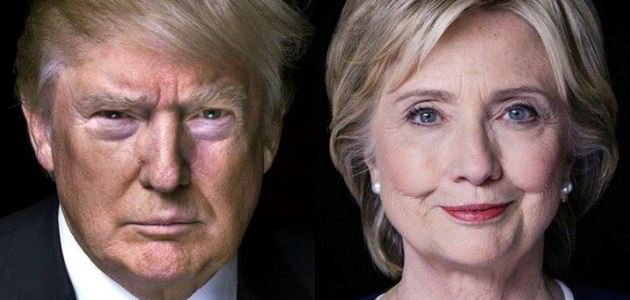
The presidential election 2016 bears significant consequences for Germany's and Europe's relations with the U.S. Picture: Rich Girard/flickr/CC BY-SA 2.0
A brief summary of a new Security Policy Working Paper: Stephan Bierling analyses Hillary Clinton's and Donald Trump’s personality profiles and decision-making styles. What are their concrete foreign policy positions, what are the consequences?
On November 8, 2016 U.S. citizens will vote in the presidential election. They have the choice between two candidates who represent completely different views on foreign policy. The former secretary of state Hillary Clinton stands for experience and predictability, whereas her contender Donald Trump aims to shield the U.S. from all immigrants and Muslim refugees in addition to questioning established international organizations such as NATO and the European Union. Hence, the outcome of this election is also of grave importance to Germany.
Although some disputes arise on topics such as the war in Iraq, the NSA or TTIP, relations between Germany and the U.S. remain strong. Thanks to the deep interconnectedness between German authorities and their American counterparts, attacks by Islamic terrorists in Germany could be prevented and an effective sanctions regime against Russia was built. If Germany and the EU aim to stabilise its neighbourhood, deter Moscow from further aggressive actions and defer the global power shift towards Asia, they will require help from the U.S. now more than ever before.
Clinton: predictable team player
Despite her strong analytical approach, Clinton demonstrates a greater willingness to make decisions compared to Obama. She will likely assume a strong, active role in international politics. Not only does she surround herself with political elites, but also seeks a rational exchange of interests with her foreign partners. In this sense U.S. rivals, in particular China and Russia, need to prepare themselves for a tenacious, confrontational president who is less interested in maintaining harmony than her predecessor.
The constellation of Clinton’s campaign team alone demonstrates her international focus. It consists of foreign policy experts such as Jake Sullivan, who played a key role in the nuclear deal with Iran, Madeleine Albright, foreign minister under Bill Clinton, Tom Donilon, Obama’s chief security advisor, Leon Panetta and Michèle Flournoy, minister of defence and secretary of state under Obama. Moreover, her candidate for vice president, Tim Kaine, is also a member of the U.S. Senate Committee on Foreign Relations and Committee on Armed Services. They are all experts on foreign and European politics and deeply connected with German political elites.
Clinton stands for continuity with an edge: She aims to put the U.S. in a strong global leadership role that is slightly more resolute than that of her predecessor. Under her leadership Bierling expects to observe expanded sanctions against Russia. At the same time Clinton is likely to slowly remove the American leadership role in the TTIP negotiations. Germany and Europe can expect to be held more accountable for stabilizing Ukraine and ensuring the security of the Baltic States.
Trump: egocentric novice
Trump currently regards international relations through the lenses of business interests and egocentrism. During the campaign, his statements regarding foreign policy issues are considered as frugal, ruthless and inconsistent. In addition to showing miscalculations and lack of general knowledge concerning foreign relations, not a single foreign policy expert supports Trump’s views on international affairs. Trump and his advisers barely possess any knowledge on Germany and Europe. American partners would need to prepare themselves for an unpredictable president who does not pay attention to any diplomatic practices.
For most foreign policy disputes, Trump offers completely different solutions than Clinton: He supports waterboarding, large-scale NSA observation programmes, and the prolongation of Guantánamo and entry bans for Muslims as well as the use of nuclear weapons against the Islamic State. Germany and Europe could not agree with a single foreign policy objective announced by Trump. Beyond U.S. borders, Trump’s success in the presidential election could strengthen nationalistic movements within Europe and have serious consequences for the prospects of NATO.
Author: Editorial staff, based on the Working Paper of Stephan Bierling
Stephan Bierling is Professor for International and Transatlantic Relations at the University of Regensburg.
Working Papers published by the Federal Academy for Security Policy should give an impulse for the debate on current security issues.
You can find the working paper 23 here (in German only): www.baks.bund.de/de/service/arbeitspapiere-sicherheitspolitik
